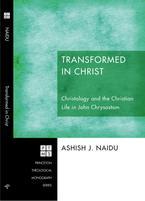 I am delighted to announce the recent publication of my monograph titled, Transformed in Christ: Christology and the Christian Life in John Chrysostom, in the Princeton Theological Monograph Series, by Pickwick Publications (Imprint of Wipf and Stock).
I am delighted to announce the recent publication of my monograph titled, Transformed in Christ: Christology and the Christian Life in John Chrysostom, in the Princeton Theological Monograph Series, by Pickwick Publications (Imprint of Wipf and Stock).
This book began life a few years ago as my doctoral thesis at the University of Aberdeen. Iain Torrance (now of Princeton Theological Seminary) and Ian McFarland (now of Candler School of Theology) supervised my research, and the late Professor David F. Wright (University of Edinburgh) served as the external examiner for my dissertation.
Synopsis from the Back Cover:
Scholarly readings of John Chrysostom’s Christology seldom examine the intimate relationship that exists between his doctrinal, sacramental, and praxeological views. The vital correlation between exegesis and praxis in patristic thought must be taken into consideration in any evaluation of christological positions. Chrysostom’s doctrine of Christ is intricately bound to life in the church. Within this conceptual framework, Chrysostom’s commentaries on John’s Gospel and Hebrews are examined. The christological portrait, which emerges from this oeuvre, is a depiction of the personal continuity of the divine Son in Christ; his sacramental presence in the church, the body of Christ; and his transforming work in the Christian, to the likeness of Christ. This persuasive study demonstrates that Chrysostom’s view of the Christian life is the outworking of his exegetically informed and pastorally rich christological doctrine.
Endorsements:
“Chrysostom is usually studied as a homiletician of remarkable rhetorical technique. This careful and probing monograph by Naidu considers him as a contributor to Christian ethics—one interested in the transformation of a human person from being a wolf to becoming a dove through coming into the ark of the church, an ark much superior to that of Noah, into which one entered as a wolf and left as a wolf.”
—Iain Torrance, Princeton Theological Seminary
"Naidu does a marvellous job of showing how Chrysostom's exegesis is driven by his concern for shaping concrete dispositions and practices of Christian piety. While giving due attention to the historical and dogmatic questions regarding the character of Chrysostom's Christology, Naidu succeeds in orienting the reader to the specifically pastoral concerns that defined this Father's approach to the biblical texts."
—Ian McFarland, Candler School of Theology
“Naidu’s engaging and lucidly written study on the Christology of St. Chrysostom is an important contribution and corrective to the literature on the “Golden Mouthed” orator…The strength of Naidu’s work lies in his organic treatment of Chrysostom’s Christology as set within the contours of his overall thought, giving particular consideration to the sacramental and praxeological dimensions that undergird his conception of the Savior’s person and work.”
—Alan Gomes, Talbot School of Theology
(This detailed version of the TOC is to give you an idea of the breakdown of each chapter)
Table of Contents
Introduction
Chapter 1: Historical Context and Background
- Early Life and Training
- Ecclesiastical Career
- Life in Exile and Death
Chapter 2: Reading and Interpretation of Scriptures in the Early Church
- The Fathers and Scripture
- Emergence of the Two Traditions of Interpretation: Alexandria and Antioch
- The Alexandrian School of Some of its Representatives
- The Antiochene School and Some of its Representatives
Chapter 3: The Doctrine of Christ in Chrysostom’s Homilies on the Gospel of John
- Contextual Overview
- A Christology of Restoration
- A Christology of Participation
- A Practical Christology
Chapter 4: The Doctrine of Christ in Chrysostom’s Homilies on Hebrews
- Contextual Overview
- A Christology of Identification
- A Christology of Mediation
- A Christology of Grace
Conclusion
- Ontological Considerations
- Sacramental Mediation
- Practical Outworking
It is my prayer that Transformed in Christ will serve as a helpful piece of scholarship, both for the academy and the church. Individuals with broad interests in areas like church history, patristics, historical and systematic theology, and with particular interests in topics like patristic biblical interpretation, and Christology and soteriology in the early church might find this work useful.
 şÚÝ®ĘÓƵ
şÚÝ®ĘÓƵ
.jpg)


